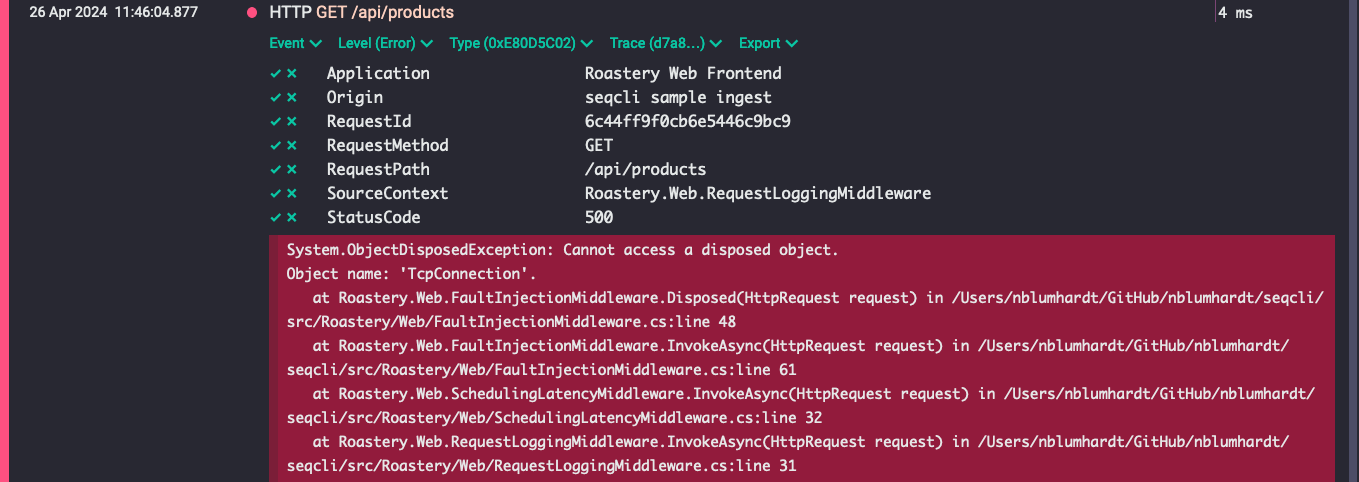Template Syntax
Many Seq apps can format output, for example email notifications or HTTP request bodies, using the Seq.Syntax templating library .
These templates closely follow the syntax of the Seq query language, adding features to enable generating plain text, HTML, or JSON.
Templates are expanded in the context of an event, such as this one:

Behind the scenes, all of the details of the event - its timestamp, level, message, exception, and properties, are accessible. The built-in properties such as the event timestamp have special names like @t. Other regular properties - RequestUrl for example - have simple names just as you'd expect.
To get a look at how templates see events, in the view above, choose Export > Copy raw JSON. If you pretty-print the result, it should look something like:
{
"@t":"2024-04-26T01:46:04.8772700Z",
"@mt":"HTTP {RequestMethod} {RequestPath}",
"@m":"HTTP GET /api/products",
"@i":"e80d5c02",
"@l":"Error",
"@x":"System.ObjectDisposedException: Cannot access a disposed object...",
"@tr":"d7a8be8ffe34c7b823c40733d6572e6e",
"@sp":"81052e753d7d7440",
"@st":"2024-04-26T01:46:04.8735910Z",
"@sk":"Internal",
"Application":"Roastery Web Frontend",
"Origin":"seqcli sample ingest",
"RequestId":"6c44ff9f0cb6e5446c9bc9",
"RequestMethod":"GET",
"RequestPath":"/api/products",
"SourceContext":"Roastery.Web.RequestLoggingMiddleware",
"StatusCode":500
}Now, assume we want to format a short message letting us know that something has broken. Here's a Seq template which does that:
{HttpMethod} {RequestPath} failed with status code {StatusCode}The result of evaluating the template will be:
GET /api/products failed with status code 500Basic syntax
Between curly braces (called "holes"), templates support:
- Most built-in Seq event properties, including
@Level,@Message, and@Exception, and their abbreviated forms@l,@t,@m,@x, - First-class properties of events and alerts, like
HttpMethodin the example above, - Most Seq scalar functions, such as
ToIsoString(),Coalesce(),Substring(),IndexOf(), and so on, - Seq operators such as
=,<>,<,>,like,in,is null, - Constant numbers
123.4, strings'abc', Booleantrueandfalse, andnull, - Arrays delimited with brackets
[]and zero-based indexing, - Object literals using braces
{}that support string-based indexing, - Most other Seq expression language features.
Literal braces in templated text fields can be escaped by doubling, {{ and }}.
Formatting of dates and numbers can be achieved using .NET format strings following a colon, e.g.:
Completed in {Elapsed:0.00} msArray and object literals support the spread operator: [1, 2, ..others], {a: 1, ..others}. Specifying an undefined property in an object literal will remove it from the result: {..User, Email: Undefined()}.
JSON output
To construct a well-formed JSON document based on event properties, construct a Seq object literal such as {n: 42}, and place it inside a hole, making sure to add a space between the "hole" braces and the object - { {n: 42} } (otherwise, the double braces will be interpreted as an escape sequence).
For example:
{ {
Timestamp: @t,
Source: 'Seq',
Contact: { Name: CompanyName, Type: 'Company' }
} }Will result in output resembling:
{
"Timestamp": "2021-09-15T06:33:21.432",
"Source": "Seq",
"Contact": {
"Name": "Datalust Pty Ltd",
"Type": "Company"
}
}Note that the outermost curly braces here must have a space between them, like
{ {, and not{{. Only the outermost pair of braces need to be doubled in this manner: their purpose is to create a template "hole" (the first{) and then construct an object (the second{) which will be serialized to JSON as the value of the hole.
Conditionals and repetition
To conditionally include text, use {#if expr}:
{#if Count = 0}
Nothing here
{#else if Count = 1}
Only one
{#else}
Found {Count} items
{#end}The else/else if blocks are optional.
Holes like {#if and {#else that begin with {# are called template directives. Directives don't get substituted directly into the output.
To iterate over array elements or object properties use {#each e in expr} or {#each k, v in expr}:
{#each name, value in @Properties}
{name} is {value}
{#delimit}
---
{#else}
No properties
{#end}The delimit and else blocks are optional.
Template directives like
{#if}only work in the outermost template - they can't be used as expressions nested inside holes or objects. In an expression, Seq's regularifconstruct can be used.
Resources and further reading
Seq templates originated from, and share a significant amount of implementation with, the Serilog.Expressions templating system.
Some detailed examples for Serilog.Expressions map directly to Seq templates; see:
- Recipes for generating plain text output
- Recipes for generating JSON output
- The Serilog.Expressions README
Updated 5 months ago
